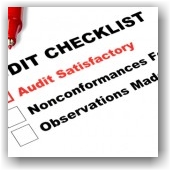April 27th, 2012
 One of the most important questions in the mind of both employer and employee is: What if information about the employee is wrong – can they fix inaccurate information about themselves in E-Verify?
One of the most important questions in the mind of both employer and employee is: What if information about the employee is wrong – can they fix inaccurate information about themselves in E-Verify?
If E-Verify is unable to automatically verify an individual’s status in order to authorize employment, a Status Verifier will manually review the information and conduct searches of other Federal government databases and, where necessary, will update any underlying information contained within the various DHS databases queried. After a result is returned on an employment authorization query, E-Verify provides two methods of information correction and redress for employees. If an employee receives a Tentative Non Confirmation, or TNC, they may correct their information through the Social Security Administration (SSA) or DHS.
After the verification process is complete, individuals have the opportunity to access and correct their information through the Freedom of Information Act (FOIA) or Privacy Act (PA) process.
We link to more E-Verify Privacy FAQs and our I-9 Employer Resource Center
Immigration Compliance Group specializes in business immigration and employer compliance matters related to audits, training and policy development.
Tags: Department Of Homeland Security (DHS), E-Verify, E-Verify News, E-Verify Privacy, E-Verify Self Check, Employment Eligibility Verification, I-9, I-9/E-Verify News, I9 Policies, ICE, Legal Workforce, Worksite Enforcement
Posted in Department Of Homeland Security (DHS), I-9/E-Verify News, ICE, Immigration News | Comments Off on E-Verify Privacy Issues | News from Immigration Compliance Group
April 27th, 2012
 FY 2013 cap filings are definitely exceeding the rate of the last two years. At this time last year, USCIS had received roughly 10,400 cap filings. As of April 20th, USCIS announced that it’s received 25,000 against the H-1B regular cap, and 10,900 against the master’s degree cap. The amount of cases received in this initial period for FY 2013 is almost twice the number received last year at this time.
FY 2013 cap filings are definitely exceeding the rate of the last two years. At this time last year, USCIS had received roughly 10,400 cap filings. As of April 20th, USCIS announced that it’s received 25,000 against the H-1B regular cap, and 10,900 against the master’s degree cap. The amount of cases received in this initial period for FY 2013 is almost twice the number received last year at this time.
The number of cases received towards the H-1b cap should alert employers who are still considering whether to file H-1b cap cases to take action. Employers should expect that the H-1b cap will be exhausted at a much earlier date than what occurred in the last few years.
As always, Immigration Compliance Group is happy to answer any questions about the H-1b process. If you’re planning to petition for H-1B employment in FY 2013, contact our office ASAP so that your case can be efficiently and promptly filed.
Tags: File H-1B, FY 2013 H-1B Cap, H-1 Master's Quota, H-1B Cap, H-1B Regular Quota, Immigration News, Specialty Occupations
Posted in H-1B Visas, Immigration News, USCIS | Comments Off on H-1B Cap Update | News from Immigration Compliance Group
April 27th, 2012
It has been reported to the American Immigration Lawyers Association (AILA) by a senior Department of State official that immigrant visas for EB-2 India and mainland China were exhausted for this fiscal year as of April 11th. USCIS will continue to accept EB-2 India/China adjustment of status applications based on the priority date cut-offs in both the April and May 2012 Visa Bulletins, but the cases will be on hold until the start of the new 2013 fiscal year as of 10/1/2012 when quotas open up again. We link to the Visa Bulletins for April and May.
According to the Visa Bulletins, EB-2 India /China applicants with priority dates earlier than May 1, 2010 can continue to file adjustment of status applications with USCIS through April 30, 2012. Those with priority dates earlier than August 15, 2007 can continue to file through May 31, 2012.
Tags: adjustment of status, Advanced Degree Green-Cards, Department of State, EB-2 China, EB-2 Green-Cards, EB-2 India, PERMANENT RESIDENCY, visa bulletin
Posted in Department of State, Immigration News, USCIS | Comments Off on EB-2 India-China Green-Card Quota Reached | News from Immigration Compliance Group
April 13th, 2012
 USCIS has partnered with business experts to ‘supposedly’ improve the way they approach the employment-based and high-skilled visa categories used by immigrant entrepreneurs. We’d really like to hope for the best on this that something major occurs as a result of opening up to public expertise and excellence in order to relax the restrictive business immigration environment that is prevalent at this time.
USCIS has partnered with business experts to ‘supposedly’ improve the way they approach the employment-based and high-skilled visa categories used by immigrant entrepreneurs. We’d really like to hope for the best on this that something major occurs as a result of opening up to public expertise and excellence in order to relax the restrictive business immigration environment that is prevalent at this time.
Director Alejandro Mayorkas kicked-off this innovative program, called the Entrepreneurs in Residence (EIR) initiative, with an Information Summit in Silicon Valley in February. Now, USCIS has entered a new phase of the initiative by bringing together the EIR Tactical Team. For 90 days this collaborative team, comprised of both USCIS employees and entrepreneurs from the private sector, will identify opportunities where USCIS can streamline pathways for foreign entrepreneurs. Team members began their work at USCIS in late March.
Last week, they traveled to the California Service Center and met with USCIS officers to discuss the visa categories most often used by immigrant entrepreneurs: H-1B, L-1 E-1, E-2, and O-1.
We direct you to Team Member bios here.
Tags: Alejandro Mayorkas, E-1 Visa, E-2 Visa, Entertainment Visas, Entrepreneurs in Residence Program, H-1B Visa, Immigrant Entrepreneurs, Immigration Compliance Group, Immigration News, Investor Visas, IT, L-1 visa, O-1 Visa, US Business Immigration, USCIS
Posted in H-1B Visas, L-1 Visa, O-1 Visas, USCIS | Comments Off on USCIS Announces the Entrepreneurs in Residence Tactical Team | Immigration Compliance Group
March 15th, 2012
 On March 12, 2012 USCIS revised the FAQs that reference the Jan 8, 2010 Donald Neufeld Memo that relates to the employer-employee relationship in adjudicating H-1B Petitions for 3rd Party Jobsite Placements. This topic is still very complex and greatly impacts the IT, healthcare and staffing agency industries in their ability to file for H-1B visa petitions on behalf of foreign professionals. We link above to this updated guidance, and remind you that our office is available to assist you with your H-1B case filings as it relates to these and other industries. If you have any questions pertaining to this topic or any other matter, please contact us.
On March 12, 2012 USCIS revised the FAQs that reference the Jan 8, 2010 Donald Neufeld Memo that relates to the employer-employee relationship in adjudicating H-1B Petitions for 3rd Party Jobsite Placements. This topic is still very complex and greatly impacts the IT, healthcare and staffing agency industries in their ability to file for H-1B visa petitions on behalf of foreign professionals. We link above to this updated guidance, and remind you that our office is available to assist you with your H-1B case filings as it relates to these and other industries. If you have any questions pertaining to this topic or any other matter, please contact us.
Tags: Department Of Homeland Security (DHS), Employer-Employee Relationship, Global Mobility, H-1B, H-1B for Healthcare, H-1B News, H-1Bs for IT, H-1Bs for Staffing Agencies, Immigration Compliance Group, Neufeld Memo, USCIS
Posted in Department Of Homeland Security (DHS), H-1B Visas, Staffing Agencies, USCIS | Comments Off on H-1B Visa: USCIS Revises FAQs on Employer-Employee Relationship for 3rd Party Placements
March 15th, 2012
 The OSC has provided a valuable resource in sharing their letter responses to various employment eligibility verification compliance inquiries from stakeholders. The topics include: Non-Discrimination Practices, Pre-Employment Inquiries, Form I-9 Document Abuse, SS No-Match Letters, Dishonesty/Falsification Issues, using acceptable language for job postings, and much more.
The OSC has provided a valuable resource in sharing their letter responses to various employment eligibility verification compliance inquiries from stakeholders. The topics include: Non-Discrimination Practices, Pre-Employment Inquiries, Form I-9 Document Abuse, SS No-Match Letters, Dishonesty/Falsification Issues, using acceptable language for job postings, and much more.
Here are a few citations:
Re: Question Concerning Re-Verifying Work Authorization when Discrepancies with SS are Discovered: “An employer is only under a duty to investigate further if it knows or has knowledge that would lead a reasonable person to believe that an individual is not authorized to work in the United States. There are many possible reasons for why an employee’s name and Social Security number may not match. Therefore, employers should not draw conclusions about an employee’s work authorization status based solely on information indicating that the employee’s name and Social Security number cannot be found in a system of records-whether the records are directly managed by the Social Security Administration or any other private or public entity. Furthermore, the mere receipt of a no-match letter or other no-match notice does not, standing alone, constitute ‘constructive knowledge’ on the part of an employer that the referenced employee is not work authorized. Only the Department of Homeland Security (DHS) is legally authorized to conclusively determine an individual’s authorization to work. OSC also cautions employers against providing an unreasonably short period of time to clear up a Social Security no-match…” It it strongly recommended that you consult with a qualified attorney in employment-related immigration law before jumping to any conclusions that might possibly escalate into a very unpleasant scenario for all parties concerned.
Question re Modifying the List of I-9 Acceptable Documents: “Document abuse occurs when an employer either demands that a worker produce more or different documents than those identified in the Form 1-9 process, or refuses to honor documents tendered that on their face reasonably appear to be genuine, based on national origin or citizenship status. To the extent that an employee either inadvertently or mistakenly indicates an incorrect immigration status in Section 1 of the Form 1-9, the limitation of documents in Section 2 may prevent that employee from presenting valid documents) acceptable for 1-9 purposes. Similarly, if the list excludes one or more documents that an employee of a particular status may possess, the limitation of documents may also prevent that employee from presenting his or her valid documents) acceptable for 1-9 purposes.” We caution you to discuss issues such as this with experienced counsel in employment-related immigration matters before action is taken.
We trust that you will find this information useful as it relates to the enforcement of the anti-discrimination provision of the INA. Please check out a list of our compliance services and solutions. Please be reminded that we invite you to contact our office with your employment-related immigration matters (I-9 audits, training, policy development and more).
About the OSC: The Office of Special Counsel for Immigration-Related Unfair Employment Practices (OSC) enforces the anti-discrimination provision (§ 274B) of the Immigration and Nationality Act (INA), 8 U.S.C. § 1324b. his federal law prohibits: 1) citizenship status discrimination in hiring, firing, or recruitment or referral for a fee, 2) national origin discrimination in hiring, firing, or recruitment or referral for a fee, 3) document abuse (unfair documentary practices during the employment eligibility verification, Form I-9, process, and 4) retaliation or intimidation.
Tags: Employment Eligibility Verification, I-9 Anti-Discrimination, I-9 AUDIT, I-9 Document Abuse, I-9 Fines, I-9 Form, I-9 process, I-9 Training, ICE, Legal Workforce, OSC, SS No-Match Letters
Posted in I-9/E-Verify News, ICE, OSC, USCIS | Comments Off on Employer Compliance Technical Assistance Letters from OSC
March 9th, 2012
 In a transcript released today of ICE Director John Morton’s testimony before the House Committee on Appropriations, Subcommittee on Homeland Security Hearing on The President’s Fiscal Year 2013 budget request for ICE, the message was clear….ICE intends to keep the pressure on employers with a continued focus on I-9 audits this year, as stated below in his statement concerning worksite enforcement:
In a transcript released today of ICE Director John Morton’s testimony before the House Committee on Appropriations, Subcommittee on Homeland Security Hearing on The President’s Fiscal Year 2013 budget request for ICE, the message was clear….ICE intends to keep the pressure on employers with a continued focus on I-9 audits this year, as stated below in his statement concerning worksite enforcement:
“We are focused on smart and effective enforcement of our immigration laws, including making sure that employers have the tools they need to maintain a legal workforce and face penalties if they knowingly violate the law.
Employment opportunities remain a primary motivation for aliens seeking illegal entry into the United States. By focusing on employers that are willing to hire illegal workers, we can eliminate the incentive that leads illegal aliens to violate our nation’s immigration laws. Since January 2009, ICE has audited more than 6,468 employers suspected of hiring illegal labor, debarred 521 companies and individuals, and imposed more than $76.4 million in financial sanctions. This focus will continue this coming fiscal year.
We have also established the ICE Mutual Agreement between Government and Employers program (IMAGE) — designed to promote voluntary compliance, educate employers about best practices and help companies train their employees to comply with the nation’s immigration-related employment laws. Last year, ICE entered into IMAGE agreements with well-known companies, including Chick-fil-A, Smoothie King, Best Western, Toyota, Tysons Food, and Kelly Services, among others. These companies agree to use E-Verify, conduct self-audits, and submit to an ICE audit. In FY 2013, ICE will continue to expand IMAGE outreach nationwide and provide regional and local IMAGE training conferences to increase voluntary compliance among key employers.”
This information should come as no surprise to our readership, who are very well informed. We would, however, like to remind you that a good faith effort is the primary consideration by ICE when determining final penalties in their worksite audits and investigations. To establish a good faith effort, have an outside audit performed by an experienced professional to determine what problems you really have; correct your paperwork, get everyone properly trained; create a written SOP statement to get everyone on the same page and enlisted in the process of maintaining a compliant workforce; enrolling in E-Verify is also recommended.
We invite you to contact our firm regarding any compliance questions/issues that you have, 562 612.3996, or by email, info@immigrationcompliancegroup.com. Check out our Employer Resource Center at www.I-9Audits.com, and our list of services and solutions.
Tags: E-Verify, Employer Compliance, I-9 Audits, I-9 Form, I-9 Policy, I-9 Training, ICE, ICE Audits, ICE investigations, John Morton, Legal Workforce, SSA No-Match, Worksite Enforcement
Posted in I-9/E-Verify News, ICE | Comments Off on ICE Reminds us of Continued Focus/Pressure on Worksite Enforcement
March 6th, 2012
 We have heard many recent reports that ICE will step up the pressure on its I-9 Field Agents to surpass the number of I-9 audits they performed in 2011, and that they will be looking at various industries such as employers in critical food, energy, and infrastructure industries. In June 2011, ICE did not specify which businesses would be specifically targeted, but did say that immigration agents would focus on seventeen sectors including agriculture, financial services, nuclear reactors, water treatment, and health care.
We have heard many recent reports that ICE will step up the pressure on its I-9 Field Agents to surpass the number of I-9 audits they performed in 2011, and that they will be looking at various industries such as employers in critical food, energy, and infrastructure industries. In June 2011, ICE did not specify which businesses would be specifically targeted, but did say that immigration agents would focus on seventeen sectors including agriculture, financial services, nuclear reactors, water treatment, and health care.
It has been recently reported by the Farm Employer’s Labor Service (FELS) that the EVP of NCAE (National Council of Agricultural Employers) was informed by credible sources that ICE field agents will once again focus their I-9 audit investigations on high-profile agriculture and restaurant employers to surpass their 2,496 I-9 audits and 3,291 work site enforcement cases conducted in 2011. More specifically, they are again (no surprise) targeting high-profile/maximum press coverage employers, the biggest farms and restaurants, and employers who were previously audited and/or had issues with DOL or DHS in the past – who can now expect to be be revisited in 2012.
With good faith effort being one of the most important rules applied in ICE enforcement audits and investigations, it is recommend that all employers get their ‘houses in order’ as it relates to I-9 employment verification eligibility compliance. We would strongly suggest that you put your emphasis on retaining an outside expert to perform a thorough I-9 audit of your active and inactive I-9 forms to really get a handle on problems and reoccurring issues buried in your I-9 forms. This step alone can save you hundreds of thousands of dollars, as well as the potential of losing employees and recruitment and re-training costs. Then get your staff trained and don’t let anyone not properly trained be involved with hands-on I-9 functions. Next, establish a written compliance statement outlining the SOP that your company will follow — a plan that makes sense for your business……then implement it, and be diligent in your efforts to create and maintain a compliant workforce showing a good faith effort to comply with I-9 regulations to the best of your knowledge and ability. Lastly, avail yourself of reliable information from skilled professionals that report on compliance issues – subscribe to a newsletter and a blog so that you can stay ahead of the game. You should check out our free information – both blog and newsletters.
We invite you to contact our firm to discuss your compliance issues, info@immigrationcompliancegroup.com or call 562 612.3996.
:::::::::::::::::::::::::::
Immigration Compliance Group focuses its practice on corporate employment verification compliance and US and Canadian inbound business immigration. Our team has a depth of experience in providing uniquely tailored services and solutions to assist clients in developing comprehensive employment authorization and immigration-related compliance. We conduct onsite and offsite I-9 audits for companies of all sizes, design training curriculum to assure that staff is knowledgeable concerning the management of their I-9 program, and we assist with policy development so that our clients have a plan and strategy that assures their compliance in a manner that makes sense for their business and evidences their good faith in establishing a compliant workforce.
Tags: E-Verify, Employer Compliance, I-9, I-9 Audits, I-9 Form, I-9 Penalties, I-9 Training, I-9 Updates, ICE, ICE Agents, ICE Audits, Immigration Compliance Group, Legal Workforce, NOI, SSA No-Match, Worksite Enforcement
Posted in Department Of Homeland Security (DHS), I-9/E-Verify News, ICE | Comments Off on I-9 News Update: Industries that ICE is Targeting
February 27th, 2012
 With H-1B filing season upon us as of April 2, 2012, we take this opportunity to remind you that although there has been slow but steady economic recovery over the last few years, the H-1B cap is expected to be reached much faster this year. This, coupled with a recent NFAP Policy Report Analysis released this month citing case denial rates of 17% with a staggering RFE (Request for Evidence) rate of 36%, sends a clear, “culture of no” message that USCIS is making it more difficult for skilled foreign nationals to work in the USA with increasing denial rates for both the H-1B and L-1 visa programs. All the more reason to be relying on experienced business immigration council for your case filings.
With H-1B filing season upon us as of April 2, 2012, we take this opportunity to remind you that although there has been slow but steady economic recovery over the last few years, the H-1B cap is expected to be reached much faster this year. This, coupled with a recent NFAP Policy Report Analysis released this month citing case denial rates of 17% with a staggering RFE (Request for Evidence) rate of 36%, sends a clear, “culture of no” message that USCIS is making it more difficult for skilled foreign nationals to work in the USA with increasing denial rates for both the H-1B and L-1 visa programs. All the more reason to be relying on experienced business immigration council for your case filings.
The NFAP report states, “Employers report the time lost due to the increase in denials and Requests for Evidence are costing them millions of dollars in project delays and contract penalties, while aiding competitors that operate exclusively outside the United States beyond the reach of USCIS adjudicators and U.S. consular officers.”
Small to medium-size companies and IT consultants and staffing agencies often bear the burden of these overbearing RFE’s. Working with smart immigration practitioners and preparing your case strategy in advance to address both your strengths and weaknesses, will pay off greatly. Here are some tips that we highly recommend be incorporated in your filings:
1) Incorporate a detailed brochure and description of the employer’s products or services and why you require a professional with a bachelor’s degree to perform the offered position. Include promotional materials, press releases or news articles to illustrate the nature of the business, new trends and growth factors in your business that substantiate the offered position.
2) Include a copy of your corporate tax return or financial statements to evidence profit and business stablity
3) Explain in detail why the position cannot be performed by an employee without a bachelor’s degree; i.e. is it standard in your industry? Provide detail (such as examples of work to be done) concerning the complexity of the position
4) Provide a real, detailed job description with the percentage of time spent on the duties of the position, the qualifications and special skills required to perform the job. Further explain any discretionary judgment that the employee will have in their job and other such areas of responsibility that are demanding or highly advanced
5) Provide evidence that you have a current and past practice of hiring bachelor’s degree employees for the subject position
6) IT and staffing agencies must be prepared to evidence the “employer-employee relationship” in H-1B offsite placement work situations by clearly evidencing the employer’s ability to “hire, pay, fire, supervise, or otherwise control the work of the employee. (based upon the January 8, 2010 Neufeld Memorandum).
If you’d like to set up a time to discuss your case with our office or to engage our services, please feel free to contact us.
Tags: DOL, F-1 Students, Global Mobility, H-1B, H-1B Job Descriptions, H-1B Visas, IT Consultants, L-1 visas, NFAP Policy Report, Specialty Workers, Staffing Agencies, USCIS
Posted in Department Of Homeland Security (DHS), Department Of Labor (DOL), H-1B Visas, L-1 Visa, Staffing Agencies, USCIS | Comments Off on Tips for H-1B Visa Petition Approvals
February 23rd, 2012
 Top officials from the White House and the U.S. Citizenship and Immigration Services are in Silicon Valley for the week to solicit viewpoints and input from the start-up community on how the administration can improve the way it hands out visas to talented entrepreneurs who’ve landed funding to create new companies. While Obama is asking the question how he can improve the immigration process for foreign entrepreneurs, he’s stating to UniVision, “I’ve got 5 years left to solve immigration.” Our question is, must we really remain in the dark ages for 5 more years?
Top officials from the White House and the U.S. Citizenship and Immigration Services are in Silicon Valley for the week to solicit viewpoints and input from the start-up community on how the administration can improve the way it hands out visas to talented entrepreneurs who’ve landed funding to create new companies. While Obama is asking the question how he can improve the immigration process for foreign entrepreneurs, he’s stating to UniVision, “I’ve got 5 years left to solve immigration.” Our question is, must we really remain in the dark ages for 5 more years?
The article states that comprehensive immigration reform legislation continues to remain stalled in congress, as is specific bi-partisan legislation that attempts to address some of these start-up visa issues. So the Obama administration is left trying to make the most of the rules that it currently has on the books by re-interpreting a more accommodating implementation of those rules with fresh information gathered from the field. The consensus is that Obama lacks the conviction to use his executive authority in an election year on controversial immigration issues, and that this is simply PR. We say — this is exactly the time for him to use his executive authority anywhere he possibly can concerning immigration reform. We shall see if anything comes of this. More on this here.
Tags: Alejandro Mayorkas, Comprehensive Immgiration Reform, Congress, eb-5, Foreign Entrepreneurs, Global Mobility, H-1B, Immigration Reform, Investor Visas, IT Summit, L-1, SILICON VALLEY, Start-ups, USCIS, USCIS Director
Posted in Comprehensive Immigration Reform, Department Of Homeland Security (DHS), H-1B Visas, Immigration Legislation, Immigration News, L-1 Visa, USCIS | Comments Off on USCIS and White House Officials Head to Silicon Valley for IT Summit
 One of the most important questions in the mind of both employer and employee is: What if information about the employee is wrong – can they fix inaccurate information about themselves in E-Verify?
One of the most important questions in the mind of both employer and employee is: What if information about the employee is wrong – can they fix inaccurate information about themselves in E-Verify?






